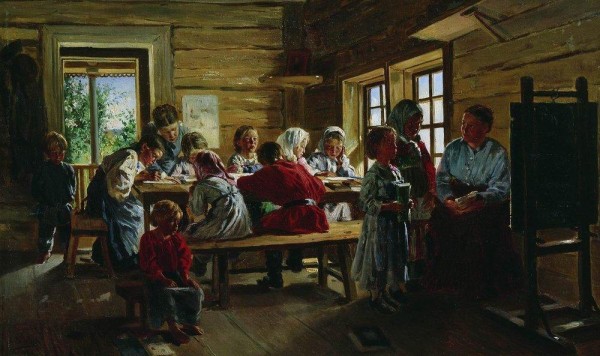In the Middle Ages, the disputed question was one of the major forms of academic investigation. A master of theology would pose a question on which great authorities seemed to disagree, and then entertain objections from fellow masters and students. After others attempted to reconcile the various authorities, the master would give a determination that resolved the question.
In our form of the disputed question, two student brothers approach a difficult issue from different angles in order to reveal its complexity. The first brother begins with a statement, to which the second brother offers a response. Each brother is then able to reply briefly in turn. The question closes with a final summary provided by the editors, who do not pretend to play the role of the master.
The Question
As the secular worldview drifts further away from promoting the virtuous life—which leads to beatitude with God—the number of conversations about parenting and family life are bound to proliferate. These sort of conversations are by no means limited to Catholic families. They take place in any community that is at odds with what is deemed socially acceptable. The realm of education is especially important since early childhood is the most formative time of a person’s life.
Parents are the primary educators of their children; therefore, they are responsible for overseeing the educational process (Catechism of the Catholic Church 1653 & 2223). As such, parents have a fundamental right to choose a school for their children (CCC 2229). The questions arise: What school system is best? Should modern Catholic parents homeschool their children?
The Statement: The Advantages of Homeschooling
Jonah Teller, O.P.
All parents should consider homeschooling as an option. Far from being overly quirky, on the fringe, or unmanageable, homeschooling is a viable alternative to more traditional school environments. Indeed, it may even be the best option, as it gives families the ability to positively shape their family life not just educationally but as a whole.
I should note, for purposes of full disclosure, that I was happily homeschooled from birth through high school. I will group my thoughts under the general topics of social life, education, and religion.
Social Life
An objecting question is raised in almost any conversation about homeschooling children: how will they be socialized? While it is true that some children do thrive in a larger social context with outside authority and accountability and a wider social group with which to interact, this is neither the only basis for socialization nor is it the primary one. The objection seems to forget that the family itself is a social setting. Indeed, the family, as “the original cell of social life” (CCC 2207), is irreplaceable as the first and foundational place for learning to relate with others. The school setting must not be confused as the only vehicle for socialization.
In fact, one of the greatest joys that I experienced as a homeschooler was its social aspect. Quite often, and especially in larger cities, there are a number of different homeschool networks in place that spring up as homeschooling families connect with each other. A benefit of this is that children often see their friends in a setting in which families are present, and thus they naturally develop the ability to interact with people of all ages with ease, from children much younger than themselves to adults.
Within the family, homeschooling nurtures and makes more intimate the bond already held between family members. Siblings of all age ranges, who for most of the day would normally only see each other at school in passing—if at all—grow closer by virtue of spending more time together. Parents and children draw closer, and, as homeschooling parents attest, the bond between husband and wife is made stronger through communicating about and working together in the project of educating their children.
Education
Educationally, the benefits offered by homeschooling are many. Homeschooling allows parents to easily adapt a child’s educational experience to complement the child’s strengths and weaknesses. Children who are particularly gifted can advance as quickly as is natural to them, without starting to feel like they are better than others or that their worth is based on their high test scores. Conversely, children who struggle in a particular area will not notice that they are slower than the rest of a class. Financially, while it is more costly than public schooling, homeschooling is much more affordable than paying tuition to attend a private school. This is especially true for larger families.
Additionally, sending a child to school (particularly some public school settings) can entail exposing the child to a steady, daily, largely unfiltered diet of all the values and mores and value-driven behaviors that characterize today’s secular (and often crass) Western culture. Sadly, this can be the case even in some Catholic schools.
Flexibility of schedule is a great benefit of homeschooling. By way of contrast, when I was teaching high school, one of my students would be dropped off by her parents in time for class at 7:00 a.m., and when I would leave, at around 6:00 p.m., she would still be at school, waiting to be picked up and taken home. She was not the only one of my students with such a day. With a schedule like that, a student would spend the vast majority of his or her waking hours at school, with only a couple of hours left in the day to interact with one’s family, eat, do homework, or even just relax. Homeschooled students are not bound by a set schedule of classes. If it takes them fifteen minutes to do their math work, then they move on to the next subject. But if another subject takes over an hour to get through, there is no problem with that either. What this flexibility of schedule allows is much more time for a child to simply enjoy his or her childhood: going outside, reading, playing with siblings or other friends, working on a hobby, taking on a part-time job, etc. Also, the day can be structured so that there is no homework with homeschooling, leaving the evenings free for time with family and other recreational pursuits.
The benefits of a homeschooling schedule extend beyond education. Parents have more opportunities to introduce their children to a life of service: volunteering in a soup kitchen or homeless center, visiting the elderly at nursing homes, helping with projects at the parish, and other things of that nature. Homeschooling does not prevent children from being able to play sports either. Homeschool groups often have their own sports teams, and some school systems allow homeschoolers in the area to play on their teams.
Religion
Homeschooling can help manifest the family’s identity as “the domestic church” (The Second Vatican Council, Lumen Gentium 11). The life of the family should be the child’s first introduction to the life of religion. Homeschooling helps with this in a special way since the life of faith can easily be lived out naturally because it is talked about, because traditions develop (special decorations put up for the liturgical seasons, for example), and because the family regularly comes together to pray, not to mention the availability of daily Mass. If a child grows up in a home filled with music, where people love it, talk about it, and play it, then that child will grow up musical, naturally soaking in the culture around him. Likewise, if a child grows up in a house of spirituality done joyfully, regularly, and seriously, then the faith will simply become part of the normal fabric of life for that child.
Final Thoughts
Ultimately, the choice to homeschool is not a purely educational choice but a choice for a distinct family lifestyle, of which education is a part. Parents must decide what is best for their particular family. It could very well be that a family homeschools some of their children and sends others to school. This was the case in my own family. Homeschooling is not better than schooling, it is just different. Perhaps it can be compared to a religious vocation. Not everyone is called to be a Dominican, not everyone is called to be a Missionary of Charity, a Franciscan, a Jesuit, or a Carthusian. Each way of life can be celebrated because it is a good option that fits a particular person’s talents and charisms. It is the same with homeschooling, and for this reason, all parents should give it serious consideration.
The Response: The Limits of Homeschooling
Nicholas Schneider, O.P.
Brother Jonah presented a basic outline of the positive reasons for homeschooling, and overall I agree with him that homeschooling is a legitimate educational option that may be the best approach for some families. However, homeschooling poses several challenges. It often means that many children miss out on some critical education and social formation that can only be gained outside of the home. After providing basic statistical information on the current state of homeschooling in the United States, I will point out some of the limitations to Br. Jonah’s arguments.
While Br. Jonah can offer personal witness to the advantages of homeschooling, I must admit that I myself was never homeschooled (I attended a Catholic elementary school from kindergarten through the sixth grade and went to public school from grades seven through twelve). That being said, my brother homeschools his children (second grade and under) in Alaska, so I do have some exposure to the current state of homeschooling.
Statistical Background
Homeschooling in the United States continues to increase in popularity, rising from 2.2% of all students in 2003 to over 3.4% today. Even though the latest US Department of Education statistics reveal a complex picture of homeschooling, there are clear trends. Keeping these trends in mind not only sheds light on why families choose to homeschool but explains some of the limitations within the homeschooling system. The typical homeschooling household has two parents, has only one of those parents in the labor force, has an income between $20,000 and $75,000, is white, and has three or more children. The most common reasons for homeschooling are concerns with the educational environment at traditional schools (e.g., lack of safety, drugs, and negative peer pressure), religious or moral instruction, and dissatisfaction with academic instruction at schools.
Religion
Providing religious and moral instruction to children is an obligation of all parents. Education in the virtues and the faith “should begin in the child’s earliest years” at home (CCC 2223 & 2226). Furthermore, education in and reinforcement of the virtues and the faith by the parents does not (and should not) cease when a child goes off to school. With the possible exception of attending daily Mass, none of the benefits mentioned by Br. Jonah concerning religion are limited to homeschoolers: families can and should pray together, discuss the faith, and develop religious traditions.
There are, unfortunately, many different value systems in the world, some of which are contradictory to and undermine those taught by Catholic parents. A child’s values will be tested whenever a child leaves home, whether that is in elementary school or in college. And it is crucial for a child to learn how to navigate our broader society by engaging people with different opinions while still keeping his or her values intact. Learning to do this is greatly aided by parents who remain active in their child’s life during that exposure to the pluralistic world. Because parents are more actively involved in their child’s life during elementary school compared to college, it would be advantageous for the child to learn how to navigate the modern world from an early age.
Education
Br. Jonah points to some of the educational benefits of homeschooling, such as flexibility and a more personalized approach to education. However, working with individuals of varied backgrounds and being able to follow a structured schedule are important life skills as well. Most managers expect their employees to arrive on time, work together on projects as necessary or directed, and stay until the end of the shift even if most of the work has been completed. Additionally, volunteer experiences, an important part of education, are not limited to homeschoolers. One of the brothers here at the Dominican House of Studies, for instance, volunteered for over 250 hours in a hospital while he was attending a Catholic high school.
As Br. Jonah would probably agree, homeschooling is not a free-for-all educational experience. Adapting and individualizing the curriculum require a lot of dedication, support, and learning for both the parents and the children. They also often require one parent to stay at home. Moreover, there are state standards and curriculum guidelines, including required testing, that must be met. As such, I suspect that most families have neither the time nor the resources to find the best homeschooling system and keep up with the various state requirements.
Furthermore, there is a steep learning curve for homeschooling parents, especially those who have never worked in education. Teaching employs a different skill set from simply knowing the material, and sometimes parents will need to learn both the material and the skills before educating their children. The time it takes school teachers to perfect their skills cannot be ignored here. Teachers do not always get things correct the first time around. In fact, most of them are constantly working to improve their teaching. Many studies support Malcolm Gladwell’s thesis: it takes about 10,000 hours of work, or five to six years of full-time activity, to become proficient at a task. Additionally, each teacher brings something different to the classroom, and the variety of teaching methods and modes of explanation helps to solidify and reinforce the material. The steep learning curve involved with the art of education means that even the best-intentioned parents may not be the best teachers.
Finally, Br. Jonah raises the very legitimate concern about finances. Catholic schools are an alternative to homeschooling that address all the major concerns of parents—environment, instruction, and values—but may be too expensive for families. This means that homeschooling is not a genuine choice based on what is best for the children and parents; rather, homeschooling becomes the only alternative to the public schools. Some steps have been taken to alleviate this. In 1985, the Diocese of Wichita, Kansas, made all their Catholic elementary schools tuition-free for all active Catholic families. In 2002, the Diocese expanded its program to include its four Catholic high schools. More work in this direction should be done to help make Catholic schools across the country a realistic alternative for families considering the best way to educate their children.
Social Life
The school setting is not the initial or primary setting for social development, but it is an essential one. Br. Jonah correctly notes that the family is the “original cell of social life” (CCC 2207), but we live in a community and a society that extend beyond the family (CCC 1877–1948). Homeschooling and homeschooling networks can certainly assist individuals to grow together in virtue and can even develop strong multigenerational bonds, which can be lacking in our mobile society.
The challenge is that children act differently when their parents are present than when they are away at school with non-familial authority figures. Therefore, a child benefits from experiencing both settings. Developing boundaries with peers and interacting with a diverse culture are critical social and emotional intelligence skills. As the child develops these skills away from home, a moral framework can be maintained and reinforced, provided the parents remain actively engaged (as discussed above). Learning to navigate these social differences with a wide cross-section of peers can only occur outside the home. For most children, this occurs at school.
Conclusion
Homeschooling certainly can be rewarding for many students, helping to form outgoing, socially mature, and generous adults. Unfortunately, not all individuals who have been homeschooled can boast of these successes. The best education parents can provide their children is to give them a strong family life at home, supporting and challenging them with values that are lived out on a daily basis. With such a foundation and continued support, children should be able to thrive at almost any school. Homeschooling should not be the first option for parents concerned about the quality of education for their children because there are some skills that can only be learned outside the home. In all cases, no matter whether the child is in public school, private school, Catholic school, or homeschool, parents need to assume responsibility for their children’s education and stay involved, while allowing their children to flourish.
A Reply to Br. Nicholas
Br. Nicholas makes his case cogently. I only have minor quibbles with his positions, with one exception which I will address later after replying to some of his other claims.
Br. Nicholas writes, “The steep learning curve involved with the art of education means that even the best-intentioned parents may not be the best teachers.” This is a good point, but I think that there is much in the homeschooling world that can help fledgling homeschool families: curriculum programs that have stood the test of time, tutors, homeschool groups where various parents teach the subjects in which they have expertise, and numerous veteran homeschooling parents who can give invaluable advice to those just beginning.
Elsewhere, Br. Nicholas expresses concern about social development. His claim that “the school setting is not the initial or primary setting for social development, but it is an essential one” seems a bit too strong. The great number of socially well-developed people who were homeschooled seems to refute the essential nature of a traditional school setting. In response to his point that “children act differently when their parents are present than when they are away at school with non-familial authority figures,” I say that such interaction can take place easily for homeschoolers: playing sports, participating in different clubs (Boy Scouts, for example), and spending time at friends’ houses are normal settings for this.
I take issue most strongly with Br. Nicholas’ claim that “because parents are more actively involved in their child’s life during elementary school compared to college, it would be advantageous for the child to learn how to navigate the modern world from an early age.” If children are not at school, it does not follow that they are somehow completely removed from the world. Everyone has to navigate the modern world, whether they are in school or not. Parents should not feel as though they have to send their child into a philosophically hostile environment so that they can learn how to “navigate” it. Homeschooling (along with good Catholic schooling) can allow parents to give their children an upbringing that, while not acting as though evil did not exist, filters many of the toxic aspects present in the general culture of the world. The innocence of one’s childhood is a foundation that can be helpful in later years spent in the midst of the world. It is not the role of a child to be an accomplished apologist, able to refute all of the contradictory and undermining value systems to which Br. Nicholas refers. That time will come, and it seems that a young adult would be best equipped for such a time by having a foundation in the truth laid in his or her childhood.
— Jonah Teller, O.P.
A Final Reply to Br. Jonah
I appreciate Br. Jonah’s reply, which emphasizes one of the key questions in the debate concerning homeschooling: the socialization question. In general, do homeschoolers develop the social skills needed to successfully navigate the modern and diverse culture in which they live? The answer is an ongoing debate, and at this time there is unfortunately no definitive answer.
School is where one encounters the entire community with all its diversity. Public schools, by their very nature, are open to everyone. Given the common demographics of those involved in homeschooling, homeschooling networks can fail to address the need of engaging the broader community or, worse, even increase the exclusionary or isolated nature of homeschooling. Additionally, school is different from activities such as sports and clubs because of the sustained length of time an individual is regularly occupied outside of the family structure.
I do believe that Br. Jonah is reading too much into my concerns about learning to navigate the modern world. I am certainly not suggesting that every child needs “to be an accomplished apologist,” nor do I think that is possible. Rather, I am merely noting that it is easier for parents to be involved in their child’s life in elementary school than in college. A necessary aspect of growing up is learning how to properly engage the world. Certainly going away to college is a large step that helps. But, my point is simply that learning to interact with peers of different faiths and cultural backgrounds should be a gradual process, not something that is all at once.
Despite these differences, both Br. Jonah and I agree that homeschooling is a legitimate educational option, and one that I believe can be successful in the right circumstances. Given the growing popularity of homeschooling, the number of resources for homeschooling families continues to expand, making it easier for more families to homeschool or at least explore it as a viable option. No matter which educational choices a family ultimately makes, we both agree that having a strong family life with parents actively involved in the education of their children is critical for constructing a strong moral foundation that will withstand the challenges of our modern society.
— Nicholas Schneider, O.P.
Recapitulation
As our interlocutors point out, the question is not about which education model is best simply, but which one is best for this particular child. And this varies from family to family, child to child. To answer the question about whether homeschooling is the right option, one must first identify the end goal and then determine the means to get there.
The primary goal of parents is to raise their children in the faith and the virtues. Furthermore, they also need to ensure proper education and prepare their children for the world around them. But how? In what school system? This is where the virtue of prudence enters. As both brothers allude to, the available options must be assessed: What is the state of the nearby school systems? And, are there sufficient resources to homeschool?
Perhaps the question that arises amidst all of this is the one that haunts many parents: Will my child retain the faith in this crazy world? If only we could predict (or even more tempting, control) the future! Given that we cannot, we should avoid either being frozen by fear, or on the other hand, resting in a naive, cultivated ignorance about the modern world. Instead, we must proceed courageously, examining the particulars prudently and imploring God’s protection. There is no external situation which God cannot work with. Trusting in His providence, the parent is able to proceed confidently to determine what is best for this particular child.
— The Editors
To download a printable PDF of this Article from
Dominicana Journal, Winter 2015, Vol LVIII, No. 2, CLICK HERE.





